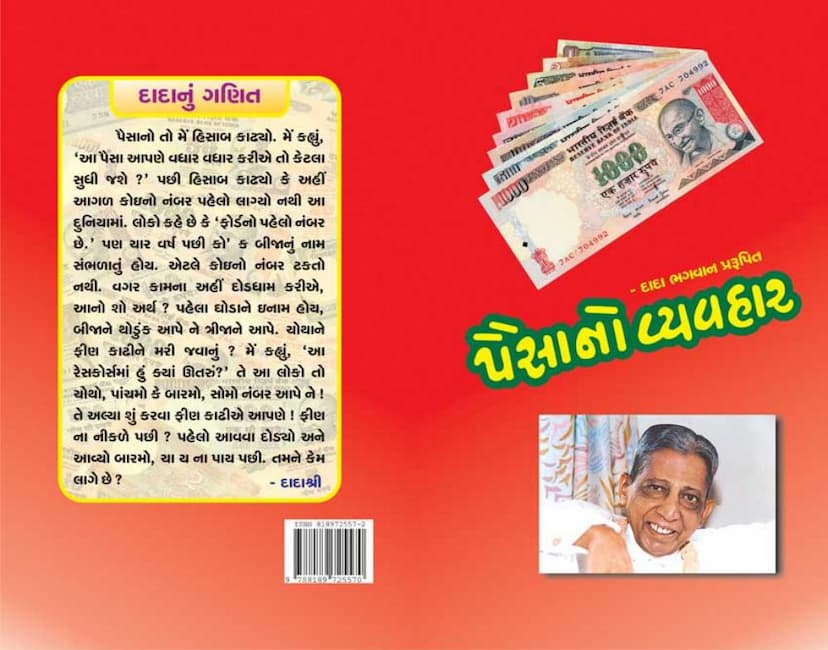Paisa No Vyavahar Sankshipt
Added to library: September 2, 2025

Summary
Here's a comprehensive summary in English of the Jain text "Paisa No Vyavahar Sankshipt" (Concise Money Transactions) by Dada Bhagwan:
This book, published by Mahavideh Foundation, is a concise compilation of the teachings of Dada Bhagwan (Param Pujya Dadashri) on the subject of money and its handling in a spiritual context. It delves into the practical and spiritual aspects of financial dealings, emphasizing the importance of maintaining purity and detachment.
Core Teachings and Principles:
- Money as a Reflection of Past Karma: Dada Bhagwan explains that wealth and financial gain are not merely the result of effort or intelligence but are primarily a fruit of past good deeds (punya). Conversely, financial loss or hardship is attributed to past negative karma (paap). Therefore, the focus should be on cultivating good karma rather than solely on accumulating wealth.
- The Nature of Lakshmi (Wealth): Lakshmi is described as being attracted to the virtuous. Those who are genuinely spiritual and righteous will naturally attract wealth, while those who chase wealth often miss out. Money is seen as transient and a source of potential attachment and conflict if not handled with detachment.
- Detached Handling of Wealth: The central theme is to engage with money and business without attachment. Dada Bhagwan's own life is presented as an example, where he earned significant wealth through his contracting business but lived simply, never accepting money from others for his spiritual work and even using his business earnings to fund spiritual gatherings. His principle was, "Dharma decreases in business, but business does not decrease in Dharma."
- The Illusion of Independent Wealth Creation: The teachings emphasize that no one is an independent doer (kartaa) of wealth creation. It is a result of a confluence of circumstances (sanyog) and past karma. Over-attachment to wealth or the belief that one is solely responsible for its accumulation leads to ego and further karma.
- The Danger of Materialistic Attachment: The book strongly warns against excessive attachment to money and material possessions. This attachment, known as "lobh" (greed), is seen as a root cause of suffering and obstacles in spiritual progress. It leads to constant worry, calculation, and a diversion from the true self (Atma).
- Dharma (Righteousness) in Financial Dealings: The book stresses the paramount importance of ethical and honest dealings. "Dishonesty is the best foolishness" is a recurring quote. Even when facing difficult business situations or the need to pay taxes, maintaining integrity is crucial.
- The Role of "Vyavasthit" (The Scientifically Accurate Self-Regulated Natural Order): Dada Bhagwan explains that the fluctuations in financial fortune are governed by "Vyavasthit." Understanding this cosmic order helps one remain calm and detached during both gains and losses. The key is to perform one's role (as a businessman, employee, etc.) with the right understanding and without ego.
- The True Purpose of Human Life: The book redirects the focus from mere wealth accumulation to the ultimate goal of human life, which is spiritual liberation (moksha). Money and business are presented as tools or contexts within which one can practice spiritual principles.
- Practical Advice:
- Fairness and Honesty: Always deal honestly and ethically. Avoid any form of deceit or unfair practice.
- Detachment from Profit and Loss: Treat profit and loss with equanimity. Do not become overly attached to gains or devastated by losses.
- Use of Money: Use wealth for good causes, for the welfare of others, and for spiritual endeavors. Avoid hoarding and excessive spending on luxuries.
- Living within Means: Spend within one's means, especially when it comes to personal expenses, and differentiate between business capital and personal income.
- The Power of Pure Intent: The intention behind financial dealings is crucial. Pure intentions lead to positive outcomes, while selfish or deceitful intentions create negative karma.
- Dealing with Debt and Difficulties: When facing financial challenges, maintain faith, reduce expenses, seek honest ways to improve the situation, and most importantly, avoid getting entangled in blame or anger.
- The Importance of Giving: Generosity and the act of giving, especially knowledge (gyan daan), are highly praised. Giving without expectation of return is considered the highest form of charity.
- The Danger of Greed (Lobh): Greed is identified as a major obstacle. The book advocates for contentment and the understanding that wealth is transient.
- The Role of "Pratikraman" (Self-Repentance): When mistakes are made in financial dealings, even unintentionally, the practice of pratikraman is advised to cleanse the karma.
- Not Worrying Excessively: While effort is necessary, excessive worry and anxiety about money are counterproductive and spiritually detrimental.
Overall Message:
"Paisa No Vyavahar Sankshipt" is not a guide to accumulating wealth but rather a spiritual manual for navigating the world of finance with integrity, detachment, and a focus on liberation. It encourages readers to see money as a transient phenomenon, a test of their spiritual progress, and a tool that, when handled with "Vyavasthit" awareness and ethical conduct, can lead to spiritual well-being and ultimately, freedom from the cycle of birth and death. The book emphasizes that true wealth lies in self-realization and detachment, not in the accumulation of material possessions.